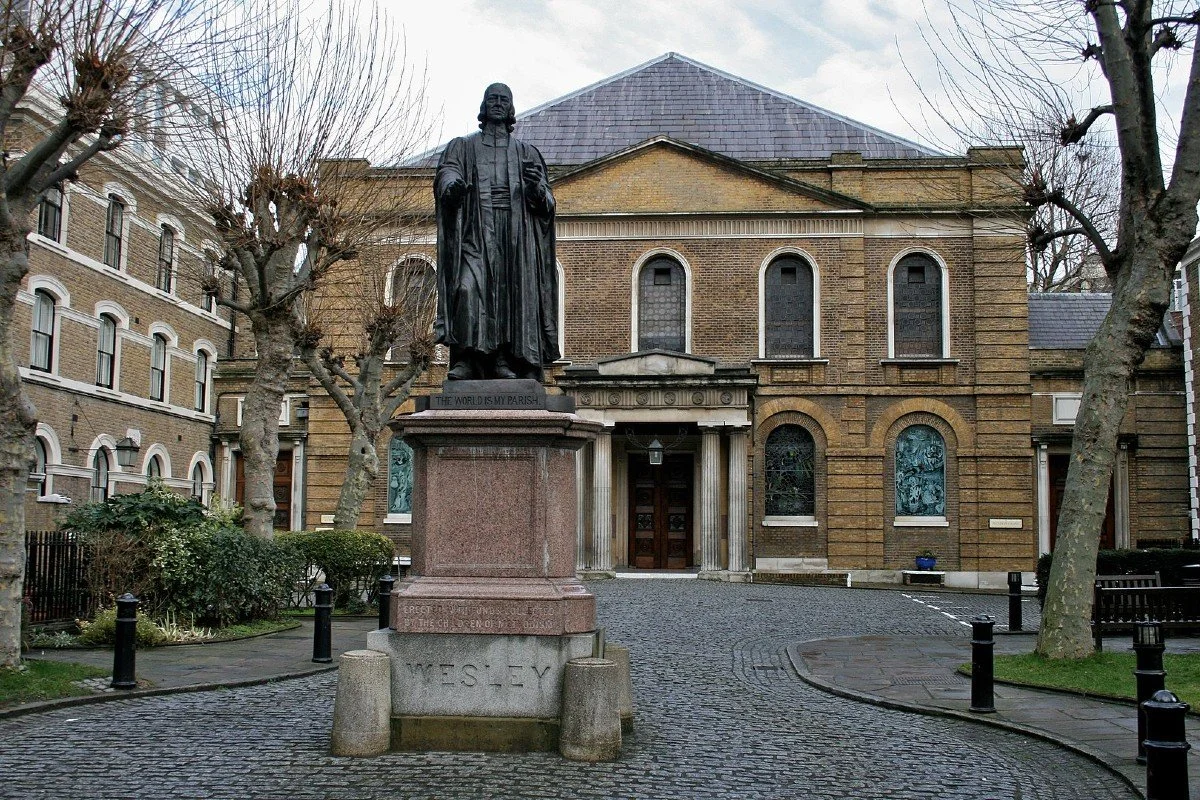John Wesley Is Rolling
This summer, while in the U.K., I made a pilgrimage (again) to a Methodist church in the south of the London Borough of Islington.
It first opened in 1798.
It was built under the direction of John Wesley, the founder of the Methodist movement. Little wonder that “Wesley’s Chapel” is considered the “mother church” of world Methodism.
Next to the chapel is John Wesley’s house. I’ve always been moved by the small room off his bedroom – essentially a closet – that was used as a prayer room. He would rise at 4 a.m. every day and spend an hour in prayer before starting his day. He would then lead devotions at 5 a.m.
I am not a Methodist, though my wife was raised in the Methodist Church. But I do appreciate historic Methodist theology and practice. And I will always embrace John Wesley as one of my great spiritual mentors.
I’ve lived and studied at Christ Church College in Oxford where his portrait hangs prominently in the dining hall.
I’ve walked the length of Aldersgate Street in London searching for the place where his heart was “strangely warmed” to the point of conversion in 1784.
And, as mentioned, I’ve been to his home and church located a few blocks from that very road on more than one occasion.
Though finding it the first time wasn’t easy.
Sitting in a nearby pub, which turned out to be within a few blocks of my destination, I asked the person waiting on me if he could direct me to Wesley’s home.
“John who?” he asked.
“John Wesley,” I answered, emphasizing the last name, thinking my American accent might have been confusing.
“Never heard of him,” he said. “But hold on, I’ll go ask.” After approaching three other workers, along with two regulars at the counter, he came back.
“Sorry, can’t help. Nobody’s heard of him,” he said. “Who is he?”
“The founder of Methodism,” I replied.
If I had puzzled him before, it had reached new heights.
“Methodism?”
Undaunted, I pressed on.
“It’s a Christian movement—well, it was a Christian movement within Anglicanism, and then it became a denomination. Wesley was its founder. His home is supposed to be near here.”
At the word “Christian” he finally gave a look of recognition. Waving his hand and dismissing the entire conversation with a laugh, he said, “You’re at the wrong place to ask about that sort of thing, mate.”
I shouldn’t have been.
I was in England, after all, and Wesley is one of her most historic sons. Educated at Oxford, Wesley was a member of the Church of England his entire life, though his successors would take his “methodical” approach to Christianity and begin ordaining ministers under the name “Methodist” shortly after his death. As mentioned, his portrait hangs prominently in Oxford’s Christ Church College dining hall to this day.
And more to the point, it was precisely men and women such as this, in pubs like this, that kept Wesley’s passion for spreading the gospel fanned into a flame.
As I write, the United Methodist Church is fracturing, largely over debates regarding sexuality and theology. Around 300 congregations have already been approved to leave the denomination, and another thousand or so will be voted on in the near future.
The ones leaving tend to be large and conservative. The flashpoints may be the affirmation of same-sex marriage and the ordination of LGBTQ clergy, but many see these as symptoms for significant differences between theology and scriptural authority.
As an article by Peter Smith for the Associated Press noted:
“In just the Western Pennsylvania Annual Conference, about 300 of its 800 churches have begun inquiring about the process of leaving by the end of 2023, according to the Wesleyan Covenant Association. Not all may follow through, but some see it as inevitable.
“‘We feel like to stay the same in our mission and theology, we need to change denominations,’ said the Rev. Steve Cordle, lead pastor of Crossroads Church. Based in Oakdale, Pennsylvania, it’s one of the largest congregations in the conference. It’s considering going independent or joining the Global Methodist Church.”
Beyond the internal divisions, the United Methodist Church as a whole is in numerical freefall, down to around 6.5 million members from a peak of 11 million in the 1960s.
But it is that line from Cordle that rings in my ears, that “to stay the same in our mission and theology, we need to change denominations.”
That is, the denomination that John Wesley founded on his vision of serving the poor, evangelizing the lost, and deep personal piety. And yes, a faithful biblicism. He always went to the Bible, and then went with the Bible.
Which means if it is truly possible for someone to roll over in their grave over something that happens after their death,
… John Wesley is sadly doing it.
James Emery White
Sources
Peter Smith, “United Methodists Are Breaking Up in a Slow-Motion Schism,” AP News, October 10, 2022, read online.

